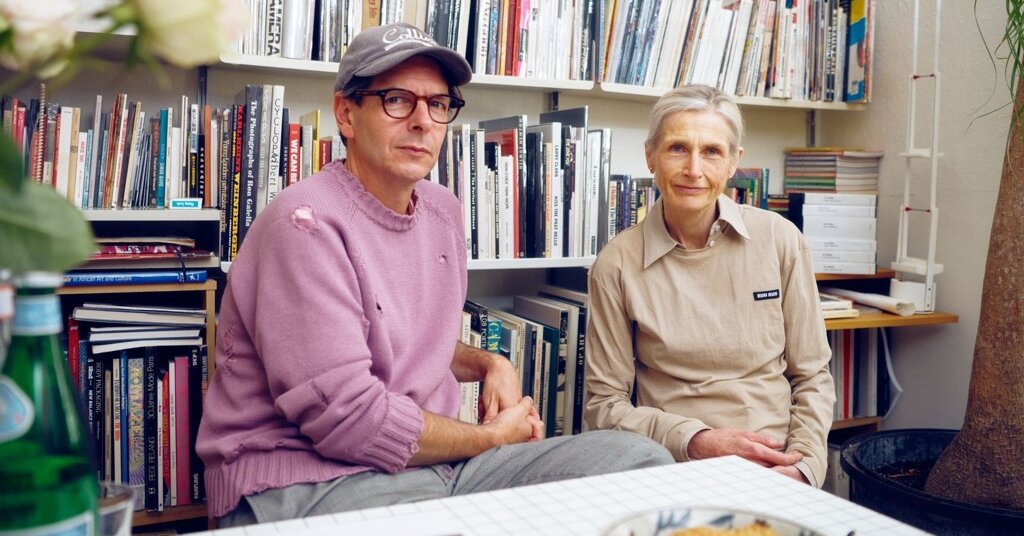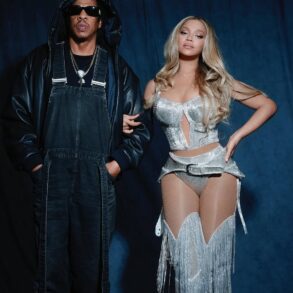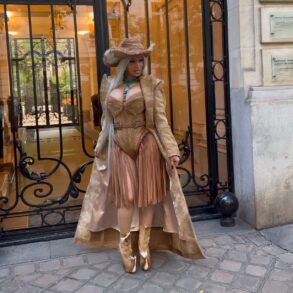
Idea, the fashion industry’s go-to dealer of rare art books, is sick of social media, so it’s moving to something more physical: a bookstore.
For Idea, a rare-book dealer and publisher in London, the dwindling of print has never been much of an issue. If anything, it has been a boon for the understated business that David Owen and Angela Hill have built, largely on the back of Instagram’s early infrastructure.
But now, Idea is navigating yet another swerve — the death of the Instagram timeline. In 2021 the social media platform moved from a chronological feed to a more opaque algorithm, which boosted videos. That meant less exposure for posts of, for example, vintage fashion books, which in turn made book selling on Instagram something of a slog.
And even though Idea has some 500,000 followers — W magazine called it an “Instagram phenomenon” in 2015 — the company is ready to experiment with a fairly antiquated idea that some may consider riskier than print itself: a physical bookstore.
In late September, Idea will open a store spread over three floors of a brick building on Wardour Street, in the London neighborhood of Soho. (The location is also Mr. Owen and Ms. Hill’s current home — they rent in the building — in a district crowded with David Bowie walking tours and lines for a Supreme store nearby.)
“What it really feels like is the perfect answer to all the frustration we’ve had with Instagram for the last couple of years, compared to the absolute joy and wonder we’ve had with it the eight previous to that,” Mr. Owen said.
When Mr. Owen and Ms. Hill started their Instagram account in 2010, it quickly became a popular feed. Glossy scans of their collection — which included issues of Six, a magazine by Commes des Garçons ($3,050); “Pentax Calendar” by Guy Bourdin ($500); and “Fiorucci: The Book” by Eve Babitz ($365) — popped out against a sea of heavily filtered selfies.
Mr. Owen wrote witty captions that helped to establish Idea’s boisterous presence among the hushed mores of rare-book selling. On Idea’s website, a standard checkout button reads: “I WILL Buy PAULA’S IBIZA So FAST JUST Say GO!”
But now, the couple said, the change to Instagram’s algorithm has resulted in some of its Instagram Stories reaching barely 1 percent of their audience. Selling vintage books the vintage way, then, holds far more appeal.
Idea is far from the only small business newly dissatisfied with Instagram as an e-commerce tool. People who built their Instagram audiences from 2014 to 2020 are beginning to feel “betrayed” by the platform, said Kyle Chayka, the author of the forthcoming book “Filterworld,” about the pervasive influence of algorithms on culture. “They can no longer reach the audiences and communities that they’ve cultivated all this time,” he said.
Idea has played a significant part in making a certain kind of book — combining high fashion and celebrity culture with loud color, camp and singular style — a collector’s item available to anyone on the internet with spare cash to burn (some titles cost more than $4,000). To many people, this book is simply an “Idea book.”
“They’ve opened up a new market of book collecting through their Instagram,” said Geoff Snack, the owner of Wrong Answer, a vintage print store that occasionally sells artworks to Idea. “Their selection helped broaden the types of books people collect and covet.”
For the past decade, Idea has operated out of a single floor of the building on Wardour Street, working out of a showroom that is often crowded.
Mr. Owen and Ms. Hill’s acumen for fresh imagery (honed from their backgrounds in music, fashion and photography) has made them a valuable resource for designers like Kim Jones and Demna Gvasalia. It has earned them gigs running social media for luxury brands, they said.
In 2016, Idea expanded to book publishing. Early monographs, like “Summercamp” (the first zine from the fashion label Vetements), Nadia Lee Cohen’s “Women” and Collier Schorr’s “Contact,” have become collectors’ items. This month, Idea published “Treasure,” the first book by the model Paloma Elsesser, in an edition of 500.
Idea’s books have small press runs — generally 1,000 or less — and are published without ISBN numbers, to help prevent reselling on Amazon. And it’s exactly this kind of exclusivity that is part of the brand’s appeal.
In keeping with that approach, there are no plans for street signage at the new store aside from a small four-button buzzer, which will spell out “idea,” and a minimalist glass door designed by Mr. Owen.
For the past year, Mr. Owen, 52, and Ms. Hill, 59, have wrestled with the idea of opening a store, often wavering on the concept. But their frustrations with Instagram kept mounting, and in-person sales, in their showroom, overtook online sales.
“I texted Angela that we should just take the whole building and she said yes,” Mr. Owen said, recalling their discussion about leasing the building. “We ran with it in about 15 minutes and didn’t overthink it. We’ll have 12 years to do that.”
One floor of the new shop will be dedicated to their vast collection of rare books (worth about $1.4 million, they said); another one to their trove of rare magazines; and a third to merchandise including hats, shirts and tote bags designed by Mr. Owen and Ms. Hill, many emblazoned with cork-dry non sequiturs (a hat stitched with the words “I DON’T WORK HERE” is a new top seller).
It’s a surprising trajectory for the couple, who had intentionally dodged the role of shopkeepers all these years. They used to outsource the brick-and-mortar responsibilities to other shops, like Dover Street Market and Colette.
Ms. Hill noted that the new store wasn’t the result of careful planning, which is of a piece with the rest of their lives.
“We don’t own property or have a pension. And we have two kids,” Ms. Hill said. “We aren’t very sensible about those kinds of things, but that’s life. We’ll build a store and then people will come in there, and they’ll buy things and have a nice time and hang out. No one needs to worry about the business plan.”
“Like, it’s great to have half a million followers,” Mr. Owen added, “but let’s just try and get 5,000 of them to visit the store between now and Christmas.”
This post was originally published on this site be sure to check out more of their content.








